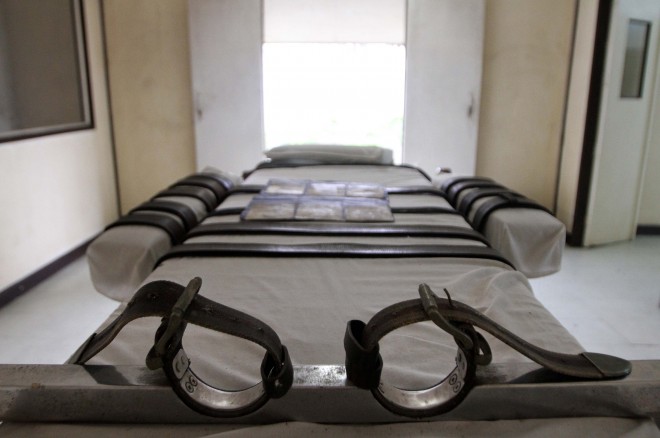
This October 10, 2014 file photo shows a bed with thick straps used to hold down a death row prisoner inside the Lethal Injection Chamber in the New Bilibid Prison, Muntinlupa City. Convicted rapist Alex Bartolome was the last person to be executed in this manner in the Philippines on January 6, 2000. INQUIRER PHOTO/LYN RILLON
MANILA — Opposition lawmakers from the independent minority bloc in the House of Representatives are calling on their colleagues to exercise a “conscience vote” on the proposed restoration of the death penalty, a priority bill of President Duterte in his campaign against illegal drugs.
“We are hoping that the decision will be based on a conscience vote and not on party politics. Members are expecting a healthy debate to guide those undecided in their decision-making,” Ifugao Representative Teddy Baguilat told the Philippine Daily Inquirer in a text message.
Baguilat is part of a broad coalition of legislators, civil society organizations, religious leaders, and non-government organizations that will campaign hard against the restoration of the death penalty.
The group has been meeting during the Christmas break of Congress in preparation for the debates on House Bill 4727, which was hastily approved at the committee level, paving the way for plenary debates.
Baguilat’s fellow opposition congressman, Edcel Lagman of Albay, said in a radio interview on Sunday that several lawmakers who have joined this coalition met several times during Congress’ holiday break.
Lagman declined to mention how many lawmakers have actually joined the coalition to prevent the administration allies from exerting pressure on congressmen on the death penalty revival.
Lagman said Speaker Pantaleon Alvarez III “does not want a conscience vote. He wants a party vote.”
“A party vote is a pressure vote. But I believe that those against [the death penalty bill] will not allow themselves to be pressured because this is their personal conviction,” Lagman said.
Lagman said this was the reason why even his party, the Liberal Party, has not come up with a party position precisely because party members have come to prefer a conscience vote.
“But most LP members, including the senators, are against the reimposition of the death penalty,” he said.
Capital punishment was abolished more than a decade ago after a handful of convicted rapists and kidnappers were executed through lethal injection.
President Duterte wants the death penalty back, saying he wants at least five executions a day, as a deterrent to the country’s illegal drug trade.
Lagman described the President’s statement as a “menacing hyperbole.”
Lagman, Baguilat, and their fellow anti-death penalty advocates argue that the death penalty has never been a deterrent to crime, even in countries that practice it.
“The truth is, there should be no heinous crimes committed anywhere if the death penalty is truly effective. Since the dawn of civilization, there has been death penalty for various crimes, varying modes of execution. But heinous crimes still exist all over the world. That is the logic that the death penalty is not really a deterrent [to crimes],” Lagman said. SFM/rga